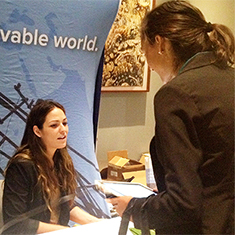At SID Conference, DAI Leads Discussion on New Models of Innovation and Collaboration
May 23, 2014
For private sector firms, filling market gaps in developing nations can be good business. Over the past couple of decades, accordingly, private resource flows to developing nations have risen exponentially, far outpacing official development assistance. This illustrates the growing potential influence of the private sector over development versus traditional donor organizations, as private companies increasingly see the need for broader social and economic development as a precondition for long-term success in these markets.
 As a result, there is a growing affinity between international development donors—that want to leverage the tools, technology, networks, resources, and expertise that private enterprise brings to the table—and private actors, who increasingly see benefits in working with partners adept at working with communities and governments in emerging economies.
As a result, there is a growing affinity between international development donors—that want to leverage the tools, technology, networks, resources, and expertise that private enterprise brings to the table—and private actors, who increasingly see benefits in working with partners adept at working with communities and governments in emerging economies.
DAI’s Kristi Ragan took up these issues and more at the Society for International Development (SID) Annual Conference in Washington, D.C., this week. Building on opening keynote remarks from U.S. Agency for International Development (USAID) Administrator Dr. Rajiv Shah, Ragan moderated “Collaborating to Scale Innovations in Science and Technology: Development, Donors, and the Private Sector,” a plenary session organized by DAI to explore the role new players and traditional donors play in the evolving landscape of international development.
Ragan, Chief of Party of USAID’s Grand Challenges for Development program, was joined before an audience of 900 by panelists April DuBois, Vice President for International Development at MasterCard Corporation; John R. Wille, Lead Private Sector Specialist at the World Bank Group; and Cathy Clark of Duke University’s CASE Initiative on Impact Investing and Social Entrepreneurship Accelerator at Duke.
Focusing on the often overlooked role of national government in promoting innovation and new partnerships, Wille flagged the importance of technology and software in public sector reform, noting that many governments have embraced the transparency—and potential for fraud reduction—afforded by technology.
DuBois, noting how Mastercard’s business is platforms for electronic payments, stressed the scale at which established private sector corporations can operate. She related the example of South Africa, where Mastercard helped the government set up a process to tackle fraudulent social security claims, saving the country $15 million in the first year and up to $375 million over five years—and fostering transparency in the process.
She acknowledged, however, that the private sector must turn to development actors for “critical pieces” such as building the capacity of local populations in financial literacy, engaging governments on policy reform, and promoting behavior change in the take-up of new technologies and approaches.
Duke’s Clark shed light on the discussion by reference to recent research on impact investment and social entrepreneurship, combined with firsthand experience of the challenges in bringing to scale the technology solutions produced by social enterprises.
“A common refrain coming out of this panel was the simple need for better awareness on all sides of the emerging partnership paradigm,” said Jean Gilson, DAI Senior Vice President for Strategy and IT, and SID-Washington’s Vice President for Chapter Affairs. “Donors and their implementing partners need to understand and accommodate their private sector partners’ objectives and incentives, and vice versa. Once that understanding is established, we can often find the common ground for mutual commitments and investment.”
RELATED CONTENT:
Now Available: The Summer 2018 Issue of DAI’s Developments Newsletter
The Summer 2018 issue of DAI’s Developments newsletter is now available and includes stories about Nigeria’s growing competitiveness, investors filling demand in East Africa, the conjoining of experts in technology and global health, and seven more articles.
Read More